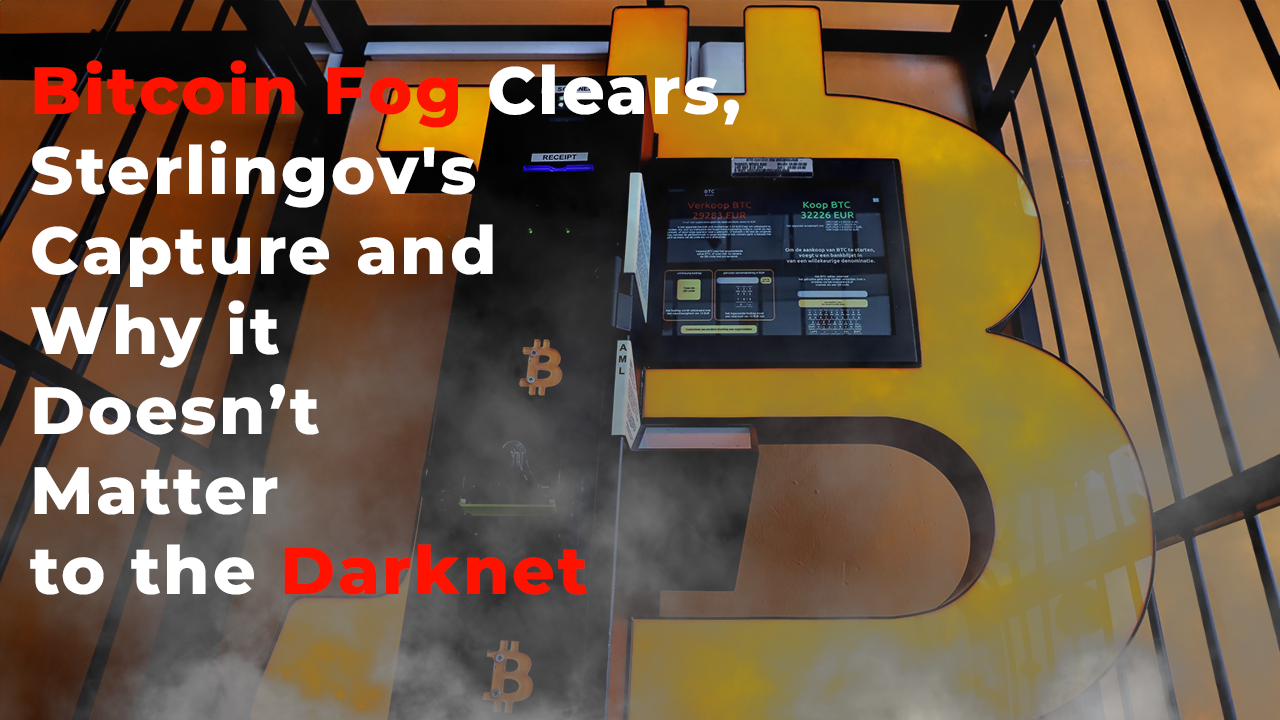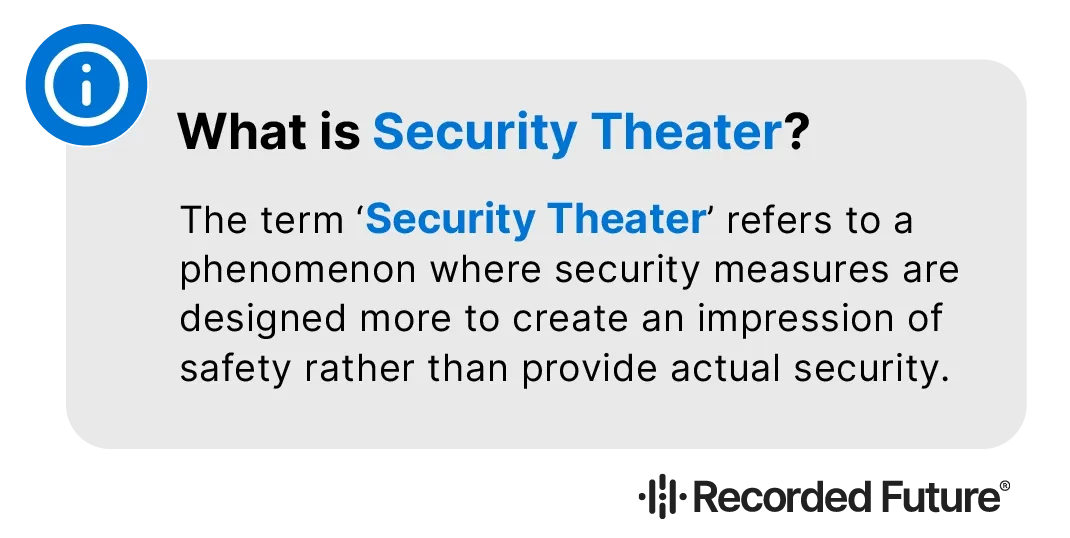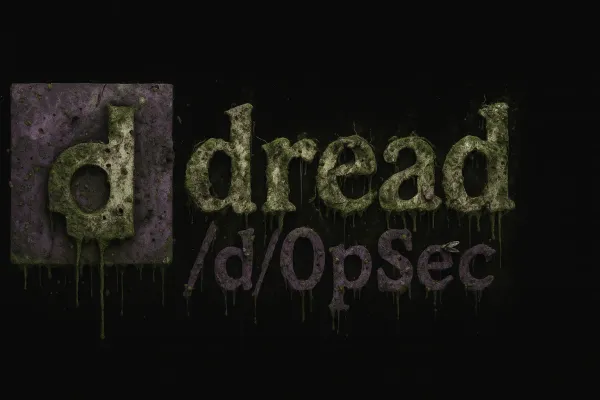Bitcoin Fog Clears: Sterlingov's Capture and Why it Doesn’t Matter to the Darknet

In the grand (security) theater of cybercrime busts, the conviction of Roman Sterlingov, the operator behind Bitcoin Fog, has been hailed as a landmark victory. Yet, for those of us who’ve navigated the shadowy corridors of the Darknet, this event is but a drop in the ocean. To categorize it as anything but that is propaganda and laughable. Let’s dissect the Sterlingov saga through a lens that captures the broader, often overlooked realities of the Darknet and cryptocurrency‘s role within it.

A Drop in the Digital Ocean
Firstly, considering the vast expanse of the Darknet, the shutdown of Bitcoin Fog barely scratches the surface. The Darknet’s transaction volume is immense, and the impact of halting one mixer service is more symbolic than it is a significant blow to the ecosystem’s operations. How many Darknet markets/admins/vendors/buyers were affected? None. They all either moved on or never used the service anyway. Most of the ‘bitcoin tumbler‘ services depend on people’s ignorance and fear.
Outdated Tools in a Modern War
Mixers like Bitcoin Fog are old news. The idea was to shuffle your digital cash so well that nobody could trace it back to you. Sounds good in theory, right? But here’s the catch: blockchain analytics have gotten so smart, they can see through the shuffle like it’s nothing. It’s like trying to use a paper map in the age of GPS; you’re just not getting the whole picture. It’s also a OpSec issue, given you don’t know how the tumbling service manages information and transactions from a security point of view.

And then there’s Monero, stepping into the ring and changing the game entirely. With Monero, the whole concept of mixing becomes almost redundant. Why bother with the digital equivalent of throwing your cash into a blender when you can use a currency built from the ground up to keep your business your business?
Even back in the day when I was a Darknet vendor, I didn’t use any nonsensical ‘Bitcoin Tumbler’ service because I had no clue if they kept records. Not knowing if they destroyed records, or kept them, or what their opsec was as a service is what killed it for me. Controlling your information is a pretty big part of OpSec.
Beyond the Reach of National Laws

The whole deal with crypto transactions is that they don’t care about borders—they’re global and don’t play by the rules of any one country. This means that all the cash and effort governments pour into chasing after mixer services don’t go as far as they think. Now, consider something genuinely sinister like human trafficking, which is a real and growing issue. It’s wild to think that so much money is being funneled into cracking down on tumblers when it could be tackling real-world evils.
Honestly, it’s baffling to see priorities like this. Chasing someone running a mixing service seems misplaced, especially when the users of these services are just people worried about their privacy but maybe not savvy enough to see the tech’s outdated, and illogical to begin with. Wouldn’t it make more sense to redirect those resources and tackle issues that cause undeniable harm, like trafficking? It’s about picking battles that matter; on this front, it feels like LE is completely missing the mark.
The Hydra Effect
Just as the mythical hydra grows two heads for every one cut off, the Darknet market quickly adapts and evolves in response to enforcement actions. Services re-emerge, often more fortified against detection and prosecution than their predecessors. Press conferences where a United States Attorney brags about how ‘criminals can no longer hide in the shadows” (I swear this is a script they all use), are nothing but self-promotion for the criminal justice system so that normal people feel like LE is doing something to ‘stop crime’.
The bragging by the United States Attorney lets anyone who didn’t know before that there is a massive void in the market space now that can be filled, and in turn, that there are millions of dollars to be made. They are shooting themselves in the foot without realizing it; for ego and bravado.
The Demand for Anonymity
Acknowledging that the demand for financial transaction anonymity is not solely driven by illicit activity is crucial. Privacy is a human right. Not everyone is okay with being under a microscope and having every transaction tracked.
The Rise of Privacy Coins
Privacy coins are gaining popularity, presenting new challenges for law enforcement that surpass the capabilities of traditional mixers. These cryptocurrencies are built with privacy in mind, making transactions nearly impossible to trace. This development marks a significant shift in the landscape of digital currencies, as it complicates the efforts of authorities to monitor and regulate illicit financial flows. The emergence of privacy coins signifies a pivotal change, demanding new approaches and technologies from those tasked with enforcing financial laws.

Collateral Damage
When law enforcement chalks up a win against services like Bitcoin Fog, there’s a side of the story that often gets glossed over: the impact on everyday privacy and financial independence. The bust of Sterlingov isn’t unique in this regard. While aimed at curbing illegal activities, these actions tend to encroach on the legitimate use of privacy tools and cryptocurrencies. This oversight can erode the rights of individuals who are not breaking the law but simply seek to maintain their privacy and control over their own finances in an increasingly surveilled world. The balance between fighting crime and preserving individual freedoms is delicate, and victories against the darknet can sometimes tip the scales in a way that affects ordinary users’ rights. Terrorists and criminals use XYZ system, so we will take the ability to use them from everyone. It’s like trying to stop drunk driving by banning cars.
Future Regulatory Impacts (and scared politicians trying to get votes)
The Sterlingov case shines a spotlight on how the current legal battles could shape tomorrow’s cryptocurrency regulations. It’s a scenario that’s not without precedent, especially when you look at how lawmakers have reacted to technology in the past. Consider, for instance, the infamous attempt by Senator Ted Stevens to describe the internet as a “series of tubes” in 2006 during debates over net neutrality. His misunderstanding underscored a broader issue: the gap between technological reality and the understanding of those crafting the laws.
This gap can lead to regulatory proposals that miss the mark. A more recent example could be seen in the initial reactions of some politicians to the rise of encryption technology. In the aftermath of the San Bernardino shooting in 2015, there were calls from some quarters, including then FBI Director James Comey and Senators like Dianne Feinstein and Richard Burr, for legislation that would compel tech companies to create backdoors into encrypted devices. Critics argued that such measures would undermine privacy and security for everyone, showing a knee-jerk reaction to a complex issue without fully understanding the implications.
As we navigate the fallout from the Sterlingov case, there’s a real risk that fear and misunderstanding could fuel similarly misguided attempts to regulate cryptocurrencies. Such regulations could potentially stifle innovation and infringe on financial autonomy, affecting everyone in the ecosystem, from startups to everyday users, not just those engaged in illicit activities.
Overlooking Socio-Economic Drivers
The spectacle surrounding big arrests in the Darknet world tends to steal the spotlight, leaving little room for a deeper dive into why these digital underworlds flourish in the first place. The truth is, the allure of the Darknet isn’t just about the thrill of illicit activities; it’s also a symptom of broader socio-economic issues that are too often ignored. When people struggle with economic instability, lack of access to traditional banking, or oppressive regimes, the Darknet can appear as a solution, albeit a risky one, offering financial or informational lifelines otherwise unavailable.
The Darknet’s Resilience and the Illusion of Control
Despite the fanfare that often accompanies the shutdown of operations like Bitcoin Fog, the reality is that the darknet’s infrastructure barely skips a beat. The narrative of significant disruption is misleading; for every service that’s taken down, there’s a lineup of new ones ready to fill the void.
This cycle of takedowns and pop-ups brings into question the real effectiveness of law enforcement efforts against the darknet. While agencies might chalk up these busts as wins, quantifying their impact on the broader darknet landscape is a murky endeavor. It’s not just about how many sites get shut down or how many operators are arrested; it’s about whether these actions make a dent in the overall ecosystem or if they’re just creating the illusion of control. The enduring and adaptive nature of the darknet suggests that a reevaluation of strategies might be in order, focusing on deeper, systemic solutions rather than just cutting off heads of the hydra, hoping it won’t regrow.



